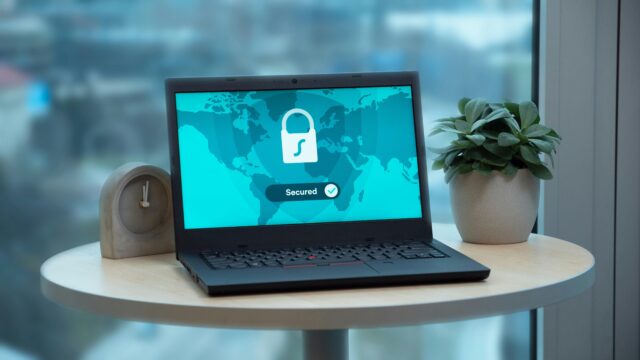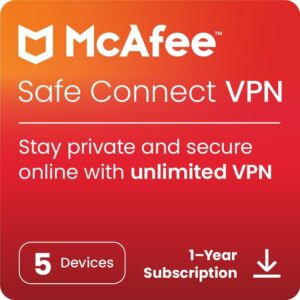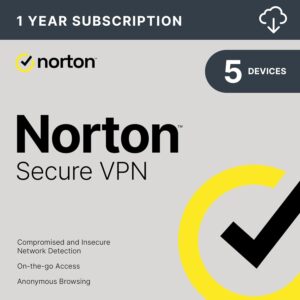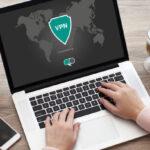If you’re wondering about VPNs and whether they’re worth it, you’re in the right place. Let’s break it down step by step that what is a VPN and is it worth using? In addition to this, I’ll share the pros, cons, and things to consider before jumping in.

What is a VPN?
A VPN, or Virtual Private Network, protects your internet connection. It hides your IP address, encrypts your traffic, and adds a layer of privacy. Think of it as a private tunnel for your data.

McAfee Safe Connect VPN 2024 Ready | 5 Device | Internet Security and Privacy Software
Safeguard your online privacy anytime, anywhere with McAfee Safe Connect Premium VPN. Similar to how a firewall shields your
computer’s data, a VPN (Virtual Private Network) safeguards your activity by encrypting your data when you connect to the internet from remote or public locations, ensuring your IP address and online actions remain hidden.
Protect your personal data and credit card information with McAfee Safe Connect Premium VPN, an intelligent VPN that activates automatically when needed. Enjoy secure browsing, banking, and online shopping, with the assurance that your data is shielded with bank-grade encryption.
Whether you’re managing finances, handling investments, or simply browsing, McAfee Safe Connect Premium VPN ensures your family’s online privacy, anytime and anywhere, with connection speeds that keep pace with your needs.
Why Use a VPN?
Here are the main reasons people use a VPN:
1. Privacy Protection
Your ISP, hackers, or even governments can track your browsing. A VPN stops this by hiding your IP and encrypting your traffic. For example, if you research health concerns, your activity won’t be linked to you.
2. Access Blocked Websites or Content
Want to watch Netflix shows available only in another country? Or access sites blocked at work? A VPN makes this possible. It tricks websites into thinking you’re browsing from a different location.
3. Security on Public Wi-Fi
Public Wi-Fi is risky. Hackers love these networks. A VPN keeps your connection secure, even on coffee shop Wi-Fi.
4. Avoid Bandwidth Throttling
ISPs slow down speeds for activities like streaming or gaming. With a VPN, your ISP won’t see what you’re doing, so they can’t throttle your speed.
5. Secure Remote Work
Businesses use VPNs to let employees work safely from anywhere. It’s useful for accessing company files while traveling.

NordVPN Standard – 1-Year VPN & Cybersecurity Software Subscription For 6 Devices – Block Malware, Malicious Links & Ads, Protect Personal Information
Defend your entire household with NordVPN, which allows simultaneous protection on up to 6 devices or secures the entire home network through router setup. It is compatible with various platforms including Windows, macOS, iOS, Linux, Android, Amazon Fire TV Stick, and more. Stop common online threats by scanning new downloads for malware, avoiding dangerous links, and blocking intrusive ads. NordVPN protects your personal details, preventing others from intercepting your data and stealing valuable information while you browse. Receive alerts through our Dark Web Monitor if your account details are detected in underground hacker sites, enabling you to take early action. Explore the internet in privacy with just one click of a button, shielding your online activities from prying eyes.
The Downsides of VPNs
1. Reduced Internet Speed
VPNs reroute your data through different servers. This can slow down your connection. The impact depends on the VPN and the server you pick.
2. Subscription Costs
Free VPNs exist, but they’re often unreliable. Paid ones offer better privacy and features, but they aren’t free.
3. Some Sites Block VPNs
Streaming services and banks often block VPNs. You might need to disconnect for these.
4. Complex Setup for Beginners
VPN apps are simpler now, but some setups can still confuse non-tech users. Free options often have more complicated steps.
5. Trust Issues with VPN Providers
Some VPNs log your data. Research your provider carefully to avoid those that misuse your information.
6. Legal Issues in Some Countries
In certain places, using a VPN is restricted. Always check local laws before using one.
How to Choose a VPN
If you’re considering a VPN, here’s what to look for:
- No-Logs Policy
Choose a provider that doesn’t track or store your data. - Good Speeds
Look for VPNs with fast servers, especially for streaming or gaming. - Compatibility
Make sure it works on your devices (Windows, Mac, Android, iPhone). - Ease of Use
User-friendly apps make life easier, especially for beginners. - Customer Support
24/7 support can help solve problems quickly.
 Norton Secure VPN,2024 Ready for up to 5 Devices
Norton Secure VPN,2024 Ready for up to 5 Devices
Protecting your online privacy and security is increasingly challenging. With the proliferation of multiple devices and Wi-Fi connections, cybercriminals find it easier to access your personal information. Moreover, your online behavior is at risk as companies track and sell your browsing history and other data. Norton Secure VPN offers comprehensive protection for your devices and the information stored on them. With Norton Secure VPN, you can confidently browse the internet at coffee shops, airports, hotels, libraries, or parks without worry.
Is a VPN Worth It for You?
It depends on your needs. If you want privacy, better security, or access to blocked sites, a VPN is a solid choice. But it’s not perfect. Some things, like slower speeds and costs, might make you think twice.
Would you like help picking a VPN or learning how to set one up? Let me know!
Now loading...




![How to Install Photoshop on Chromebook in 3 Easy Ways 71jKLnA8IlL._AC_SL1500_[1]](https://www.smashingapps.com/wp-content/uploads/2025/01/71jKLnA8IlL._AC_SL1500_1-150x150.jpg)

